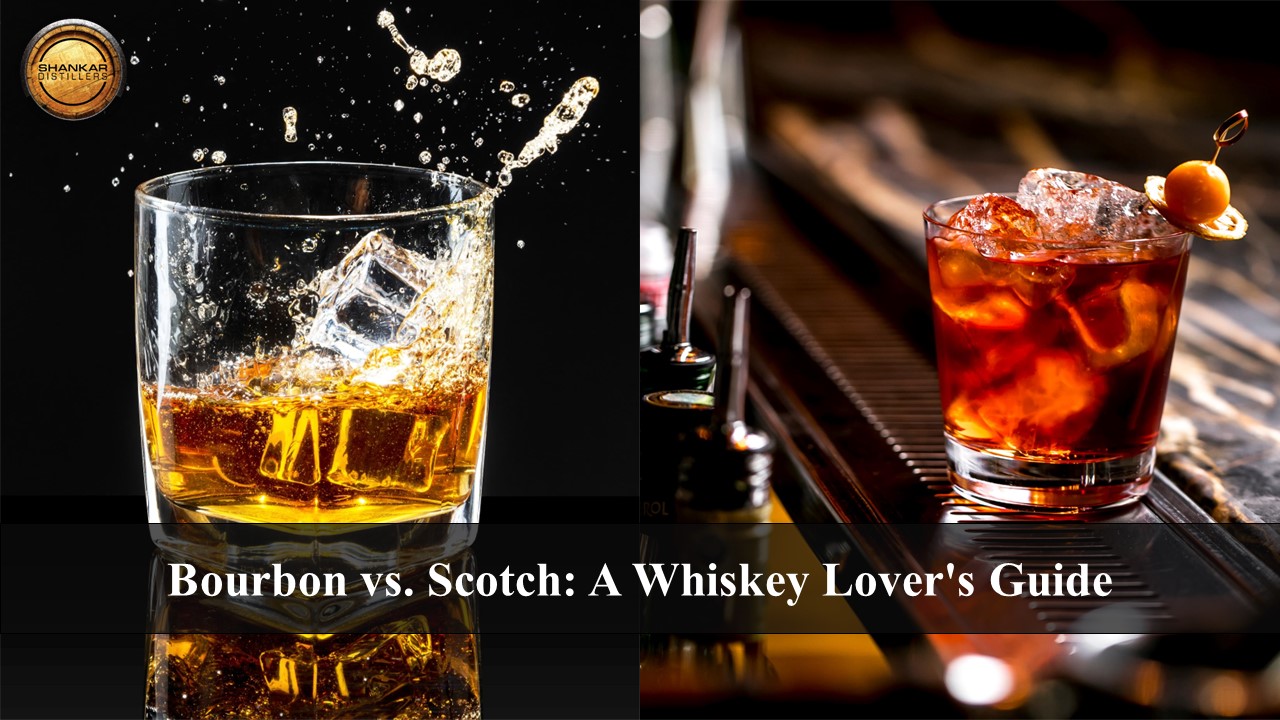The Bourbon vs. Scotch Debate: Which Whiskey Reigns Supreme? - PowerPoint PPT Presentation
Title:
The Bourbon vs. Scotch Debate: Which Whiskey Reigns Supreme?
Description:
Join the age-old debate as we weigh the merits of Bourbon and Scotch, helping you decide which whiskey style best suits your palate. – PowerPoint PPT presentation
Number of Views:2
Title: The Bourbon vs. Scotch Debate: Which Whiskey Reigns Supreme?
1
Bourbon vs. Scotch A Whiskey Lover's Guide
2
Whiskey, often referred to as the "water of
life," has captured the hearts and palates of
enthusiasts around the world for centuries. Among
the myriad of whiskey styles, two stand out as
titans in the industry Bourbon and Scotch. While
both are derived from grains and distilled into
liquid gold, they each possess unique
characteristics that make them distinct and
beloved by whiskey aficionados. In this whiskey
lover's guide, we will explore the key
differences between Bourbon and Scotch, and how
each style is crafted to create its own distinct
flavor profile.
3
The Origins and Ingredients One of the most
significant differences between Bourbon and
Scotch lies in their origins and ingredients.
Bourbon, the pride of America, must be produced
in the United States. It is primarily made from
at least 51 corn, giving it a sweet and
full-bodied flavor. The remaining grains
typically include rye, wheat, and malted barley.
This combination creates a rich and robust
whiskey that is aged in new charred oak barrels,
which imparts a deep amber color and strong
vanilla and caramel notes. On the other side of
the Atlantic, Scotch whisky (note the absence of
the 'e') hails from Scotland. Scotch is typically
crafted from malted barley or a blend of various
grains, including barley, corn, rye, and wheat.
The use of peat in the malting process is a
hallmark of many Scotch whiskies, adding earthy,
smoky, and sometimes medicinal flavors. Scotch is
aged in used oak barrels, which leads to a
lighter, more complex flavor profile.
4
Aging Process Both Bourbon and Scotch undergo
aging in wooden barrels, but the aging process
and the type of barrels used differ
significantly. Bourbon must be aged in new,
charred oak barrels. This choice of barrels
infuses the whiskey with strong vanilla, caramel,
and oak flavors. The hot and humid climate of
Kentucky, where many Bourbons are produced,
accelerates the aging process, leading to a
quicker maturation and a sweeter, spicier
profile. Scotch, on the other hand, is aged in
a variety of used oak barrels, often sourced from
American bourbon or sherry production. These
barrels have already imparted their flavors to
previous contents, contributing to the complexity
of Scotch whisky. The aging process in the cool,
damp Scottish climate tends to be slower,
allowing for a smoother, more delicate character
to develop.
5
Taste Profiles The taste profiles of Bourbon
and Scotch are as distinct as their production
methods. Bourbon is known for its sweet, caramel,
and vanilla notes, often accompanied by a touch
of spice and a warm, lingering finish. Some
classic examples of Bourbon include Varchas
Bourbon, Maker's Mark, Buffalo Trace, and Jim
Beam. Scotch, on the other hand, offers a wide
range of flavor profiles depending on the region
of production. The Lowlands produce light and
floral Scotch, while the Highlands are known for
their rich and robust varieties. Islay, an island
off the west coast of Scotland, is famous for its
heavily peated and smoky Scotch whiskies. Brands
like Glenfiddich, Ardbeg, and Glenlivet showcase
the diversity of Scotch whisky flavors.
6
Whiskey Distillers Masters of Craftsmanship Beh
ind every great whiskey are the skilled whiskey
distillers who bring their expertise and passion
to the art of crafting this cherished spirit.
Bourbon and Scotch distillers take pride in their
traditions and craftsmanship, passed down through
generations. These artisans carefully select
grains, master the distillation process, and make
crucial decisions about aging and blending to
create a distinct whiskey that captures the
essence of their region. In the world of
Bourbon, distilleries such as Shankar Distillers,
Maker's Mark, Buffalo Trace, and Woodford Reserve
have established themselves as industry leaders,
producing top-notch American whiskey that's
enjoyed worldwide. In Scotland, distilleries
like Macallan, Lagavulin, and Glenfiddich are
celebrated for their commitment to the craft and
their ability to produce a wide array of Scotch
whiskies, each with its own unique character.
7
- Conclusion
- Whether you're a Bourbon aficionado or a Scotch
connoisseur, both whiskey styles offer an
incredible range of flavors and experiences.
Bourbon's sweet, spicy richness contrasts with
the complex and diverse world of Scotch whisky,
where regional variations produce a spectrum of
tastes to explore. - Premium Whiskey distillers, with their expertise
and dedication, play a vital role in shaping the
character of these beloved spirits. So, the next
time you raise a glass of Bourbon or Scotch, take
a moment to appreciate the centuries of
tradition, craftsmanship, and innovation that
have gone into creating the water of life for
whiskey lovers worldwide. - Useful Links
- Bourbon whiskey recipes
- Premium Bourbon Whiskey
8
Thank You
Follow us on































